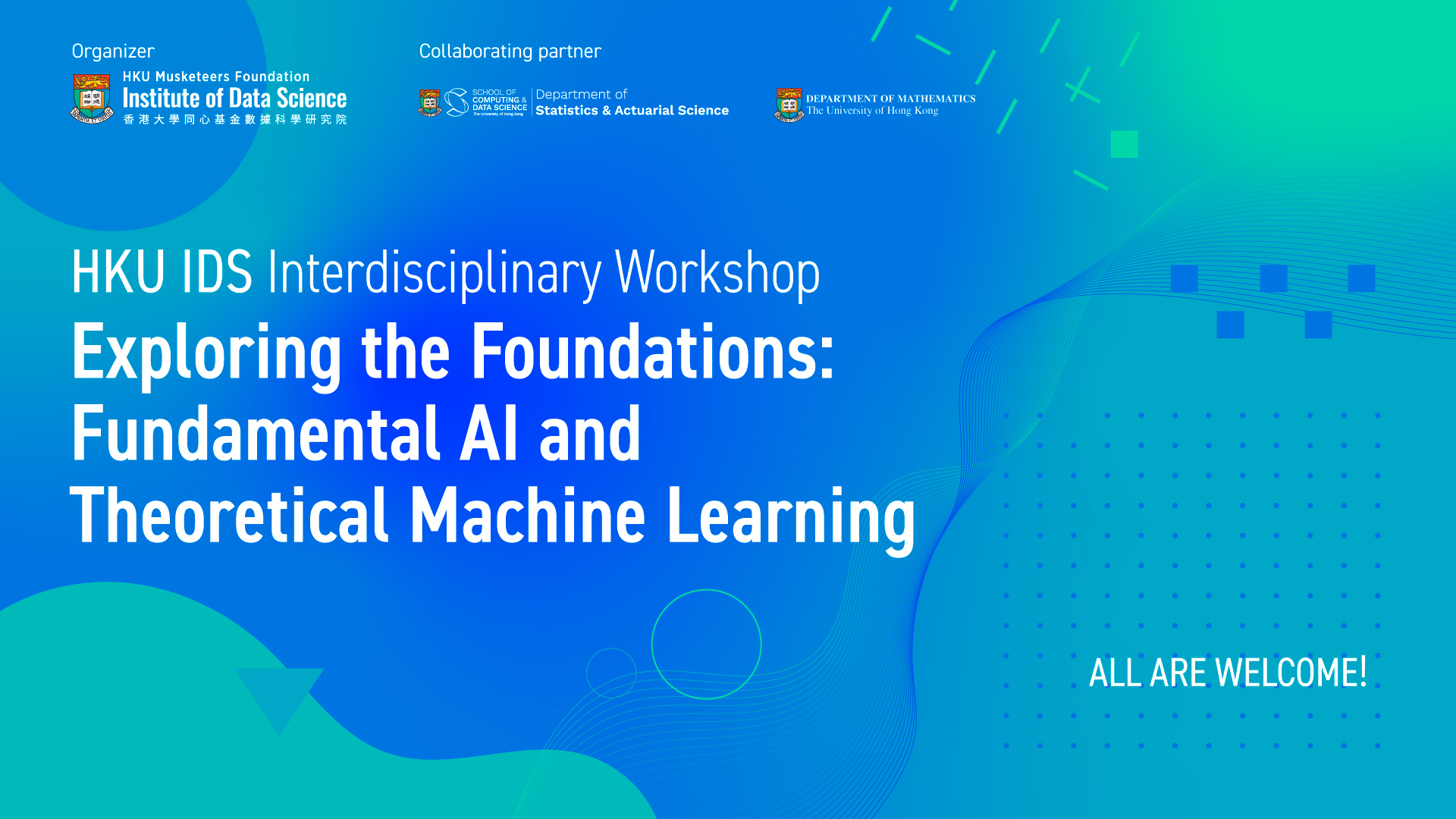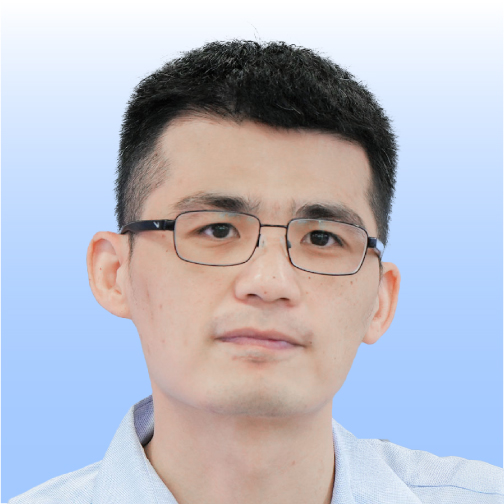
Organizer

Collaborating partner
 &
& 
Date
28 – 29 May, 2025 (Wed – Thu)
Venue
1/F – MWT6, Meng Wah Complex, Main Campus, HKU
Invited Speakers
Prof Anru ZHANG
Duke University
Prof Guodong LI
Prof Guodong LI
Organizing Committee
Chairman
Prof Guodong LI
School of Computing and Data Science
Prof Long FENG
School of Computing and Data Science
Prof Yingyu LIANG
Prof Yuan CAO
School of Computing and Data Science
Dr Wenjie HUANG
HKU Speakers
Prof Yi MA
Prof Yuan CAO
School of Computing and Data Science
Dr Wenjie HUANG
Dr Yue XIE
Prof Difan ZOU
HKU Musketeers Foundation Institute of Data Science
School of Computing and Data Science
Programme
28 May, 2025 (Wed)
Morning Session
| 08:30 – 09:00 |
Registration |
| 09:00 – 09:15 |
Opening Remarks by Prof Yi MAThe University of Hong Kong |
| 09:15 – 10:05 |
Prof Anru ZHANGDuke UniversitySmooth Flow MatchingAbstractFunctional data, i.e., smooth random functions observed over continuous domains, are increasingly common in fields such as neuroscience, health informatics, and epidemiology. However, privacy constraints, sparse/irregular sampling, and non-Gaussian structures present significant challenges for generative modeling in this context. In this work, we propose Smooth Flow Matching, a new generative framework for functional data that overcomes these challenges. Built upon flow matching ideas, SFM constructs a smooth three-dimensional vector field to generate infinite-dimensional functional data, without relying on Gaussianity or low-rank assumptions. It is computationally efficient, handles sparse and irregular observations, and guarantees smoothness of the generated functions, offering a practical and flexible solution for generative modeling of functional data. |
| 10:05 – 10:55 |
Prof Yingyu LIANGThe University of Hong KongCan Language Models Compose Skills Demonstrated In-Context?AbstractThe ability to compose basic skills to accomplish composite tasks is believed to be a key for reasoning and planning in intelligent systems. In this work, we propose to investigate the \emph{in-context composition} ability of language models: the model is asked to perform a composite task that requires the composition of some basic skills demonstrated only in the in-context examples. This is more challenging than the typical setting where the basic skills and their composition can be learned in the training time. We perform systematic empirical studies using example language models on linguistic and logical composite tasks. The experimental results show that they in general have limited in-context composition ability due to the failure to recognize the composition and identify proper skills from in-context examples, even with the help of Chain-of-Thought examples. We also provide a theoretical analysis in stylized settings to show that proper retrieval of the basic skills for composition can help the composite tasks. Based on the insights, we propose a new method, Expanded Chain-of-Thought, which converts basic skill examples into composite task examples with missing steps to facilitate better utilization by the model. The method leads to significant performance improvement, which verifies our analysis and provides inspiration for future algorithm development. |
| 10:55 – 11:10 |
Tea & Coffee Break |
| 11:10 – 12:00 |
Prof Atsushi SUZUKIThe University of Hong KongHallucinations are inevitable but statistically negligibleAbstractHallucinations, a phenomenon where a language model (LM) generates nonfactual content, pose a significant challenge to the practical deployment of LMs. While many empirical methods have been proposed to mitigate hallucinations, a recent study established a computability-theoretic result showing that any LM will inevitably generate hallucinations on an infinite set of inputs, regardless of the quality and quantity of training datasets and the choice of the language model architecture and training and inference algorithms. Although the computability-theoretic result may seem pessimistic, its significance in practical viewpoints has remained unclear. In contrast, we present a positive theoretical result from a probabilistic perspective. Specifically, we prove that hallucinations can be made statistically negligible, provided that the quality and quantity of the training data are sufficient. Interestingly, our positive result coexists with the computability-theoretic result, implying that while hallucinations on an infinite set of inputs cannot be entirely eliminated, their probability can always be reduced by improving algorithms and training data. By evaluating the two seemingly contradictory results through the lens of information theory, we argue that our probability-theoretic positive result better reflects practical considerations than the computability-theoretic negative result. |
Afternoon Session
| 14:00 – 14:50 | Prof Yiqiao ZHONGUniversity of Wisconsin–Madison
Can large language models solve compositional tasks? A study of out-of-distribution generalizationAbstractLarge language models (LLMs) such as GPT-4 sometimes appeared to be creative, solving novel tasks with a few demonstrations in the prompt. These tasks require the pre-trained models to generalize on distributions different from those from training data—which is known as out-of-distribution generalization. For example, in “symbolized language reasoning” where names/labels are replaced by arbitrary symbols, yet the model can infer the names/labels without any finetuning. In this talk, I will focus on a pervasive structure within LLMs known as induction heads. By experimenting on a variety of LLMs, I will empirically demonstrate that compositional structure is crucial for Transformers to learn the rules behind training instances and generalize on OOD data. Further, I propose the “common bridge representation hypothesis” where a key intermediate subspace in the embedding space connects components of early layers and those of later layers as a mechanism of composition. |
| 14:50 – 15:40 | Prof Long FENGThe University of Hong Kong A Nonparametric Statistics Approach to Feature Selection in Deep Neural NetworksAbstractFeature selection is a classic statistical problem that seeks to identify a subset of features that are most relevant to the outcome. In this talk, we consider the problem of feature selection in deep neural networks. Unlike typical optimization-based deep learning methods, we formulate neural networks into index models and propose to learn the target set using the second-order Stein’s formula. Our approach is not only computationally efficient by avoiding the gradient-descent-type algorithm for solving highly nonconvex deep-learning-related optimizations, but more importantly, it can theoretically guarantee variable selection consistency for deep neural networks when the sample size $n = \Omega(p^2)$, where $p$ is the dimension of the input. Comprehensive simulations and real genetic data analyses further demonstrate the superior performance of our approach. |
| 15:40 – 15:55 | Tea & Coffee Break |
| 15:55 – 16:45 | Prof Difan ZOUThe University of Hong Kong On the sampling theory for auto-regressive diffusion inferenceAbstractDiffusion models have revolutionized generative AI but face two key challenges: slow sampling and difficulty capturing high-level data dependencies. This talk presents breakthroughs addressing both limitations. We first introduce a Reverse Transition Kernel (RTK) framework that reformulates diffusion sampling into fewer, well-structured steps. By combining RTK with advanced sampling techniques, we develop accelerated algorithms that achieve faster convergence than standard approaches while maintaining theoretical guarantees. Next, we enhance diffusion models’ ability to learn structured relationships through auto-regressive (AR) formulations. Our analysis shows AR diffusion better captures conditional dependencies in complex data (like physical systems), outperforming standard models in structured settings while remaining efficient. Crucially, AR diffusion adapts automatically – excelling when dependencies exist but matching vanilla performance otherwise. We will further discuss some potential future directions for understanding and improving the existing diffusion model paradigm. |
| 16:45 – 17:30 | Dr Yue XIEThe University of Hong Kong Stochastic First-Order Methods with Non-smooth and Non-Euclidean Proximal Terms for Nonconvex High-Dimensional Stochastic OptimizationAbstractIn solving a nonconvex stochastic optimization (SO) problem, in general, the most existing bounds on the sample complexity of stochastic first-order methods depend linearly on the problem dimensionality $d$, exhibiting a rate of complexity $ \mathcal{O} (d / \epsilon^4 ) $. This linear growth rate is increasingly undesirable for modern large-scale SO problems. In this work, we propose dimension-insensitive stochastic first-order methods (DISFOMs) to address nonconvex SO problems via introducing non-smooth and non-Euclidean proximal terms. Under mild assumptions, we show that DISFOM exhibits a complexity of $ \mathcal{O} ( (\log d) / \epsilon^4 ) $ to obtain an $\epsilon$-stationary point. Furthermore, we prove that DISFOM employing variance reduction can sharpen this bound to $\mathcal{O}( (\log d)^2/\epsilon^3 )$, which perhaps leads to the best-known sample complexity result in terms of $d$. We provide two choices of the non-smooth distance functions, both of which allow for closed-form solutions to the proximal step in the unconstrained case. When the SO problem is subject to polyhedral constraints, the proposed non-smooth distance functions allow efficient resolution of the proximal projection step via a linear convergent ADMM. Numerical experiments are conducted to illustrate the dimension insensitive property of the proposed frameworks. |
29 May, 2025 (Thu)
Morning Session
| 09:00 – 09:50 | Prof Guodong LIThe University of Hong Kong Unraveling Recurrent Dynamics: How Neural Networks Model Sequential DataAbstractThe long-proven success of recurrent models in handling sequential data has triggered researchers to explore its statistical explanations. Yet, a fundamental question remains unaddressed: What elementary temporal patterns can these models capture at a granular level? This paper answers this question by discovering the underlying basic features of recurrent networks’ dynamics through an intricate mathematical analysis. Specifically, by block-diagonalizing recurrent matrices via real Jordan decomposition, we successfully decouple the recurrent dynamics into a collection of elementary patterns, yielding a new concept of recurrence features. It is further demonstrated by empirical studies that the recurrent dynamics in sequential data are mainly dominated by low-order recurrence features. This motivates us to consider a parallelized network comprising small-sized units, each having as few as two hidden states. Compared to the original network with a single large-sized unit, it accelerates computation dramatically while achieving comparable performance. |
| 09:50 – 10:40 | Prof Yuan CAOThe University of Hong Kong Understanding token selection in the self-attention mechanismAbstractTransformers have emerged as a dominant force in machine learning, showcasing unprecedented success in a wide range of applications. Their unique architecture, characterized by self-attention mechanisms, has revolutionized the way models process data. In this talk, we delve into a series of theoretical case studies focused on understanding token selection within the self-attention mechanism. We first demonstrate that a one-layer transformer model can be successfully trained by gradient descent to perform one-nearest neighbor prediction in context. Then, we show the capacity of one-layer transformers to learn variable selection and solve linear regression with group sparsity. We also investigate the capability of simple transformer models in learning random walks. At the core of these theoretical studies is to analyze how the softmax self-attention can be trained to perform reasonable token selection. |
| 10:40 – 10:55 | Tea & Coffee Break |
| 10:55 – 11:45 | Prof Yunwen LEIThe University of Hong Kong Stochastic Gradient Methods: Bias, Stability and GeneralizationAbstractRecent developments of stochastic optimization often suggest biased gradient estimators to improve either the robustness, communication efficiency or computational speed. Representative biased stochastic gradient methods (BSGMs) include Zeroth-order stochastic gradient descent (SGD), Clipped-SGD and SGD with delayed gradients. In this talk, we present the first framework to study the stability and generalization of BSGMs for convex and smooth problems. We apply our general result to develop the first stability bound for Zeroth-order SGD with reasonable step size sequences, and the first stability bound for Clipped-SGD. While our stability analysis is developed for general BSGMs, the resulting stability bounds for both Zeroth-order SGD and Clipped-SGD match those of SGD under appropriate smoothing/clipping parameters. |
| 11:45 – 12:35 | Dr Wenjie HUANGThe University of Hong Kong The role of mixed discounting in risk-averse sequential decision-makingAbstractThis work proposes a new principled constructive model for risk preference mapping in infinite-horizon cash flow analysis. The model prescribes actions that account for both a traditional discounting by scaling the future incomes and a random interruption time for the cash flow. Data from an existing field experiment provides evidence that supports the use of our proposed mixed discounting model in place of the more traditional one for a significant proportion of participants, i.e. 30% of them. This proportion climbs above 80% when enforcing the use of more reasonable discount factors. On the theoretical side, we shed light on some properties of the new preference model, establishing conditions under which the infinite-horizon risk is finite, and conditions where the mixed discounting model can be seen as either equivalent or providing a bound on the risk perceived by the traditional approach. Finally, an illustrative example on optimal stopping problem shows impacts of employing our mixed discounting model on the optimal threshold policy. |
| 12:35 – 12:45 | Closing Remarks |
For enquiry, please contact us at datascience@hku.hk.

















